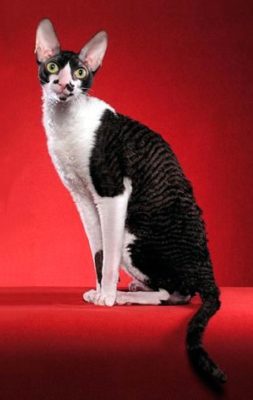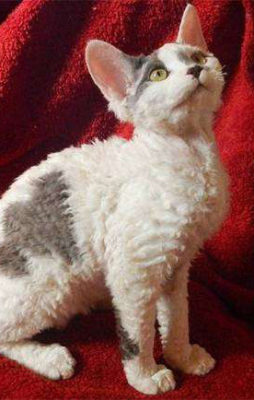Oregon Rex
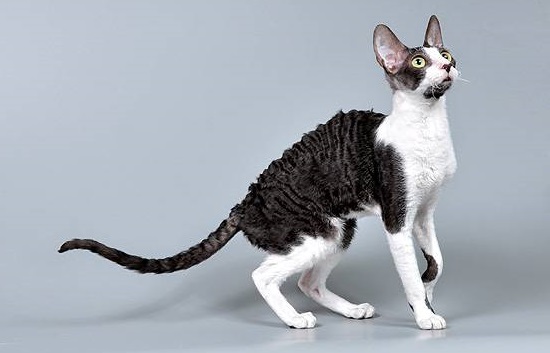
The Oregon Rex is a breed that cannot be called quiet and calm. They are mostly cheerful and playful, sometimes restless and a little arrogant. Oregon Rexes are very sociable; they enjoy spending time in the company of the family, including children. At the same time, they rarely find common ground with other animals, with whom they may have arguments over territory.
Table of Contents
Breed Information
| Origin | United States |
| Size | 24-30 cm |
| Weight | Males 5-6 kg Females 4-5 kg |
| Fur Type | Short-haired |
| Color | Any colors except tonkijski, chocolate and mauve colors, as well as cinnamon and colorpoint |
| Lifestyle | Indoors |
| Lifespan | 12-15 years |
| FIFe Classification | – |
| WCF Classification | – |
| TICA Classification | – |
| Group | Short-haired cats, cats for kids |
| Price | $300-700 |
Breed Photos
Origin History
The Oregon Rex is one of several domestic cat breeds that originated through a genetic mutation of the American short-haired cat. The first mention of the Oregon Rex breed dates back to around the 1940s. At that time in Oregon, among a litter of American short-haired kittens was found one kitten, which differed from the others a special kind of hair. While all kittens had straight hair, this particular kitten had curly hair. The recognition of these cats as a separate breed came about a decade after the first kitten. In 1955, the Oregon Rex was officially registered.
After recognition, breeders began to actively breed the Oregon Rex breed, which enjoyed great popularity. Years later, the authenticity of the breed was broken. It was due to active experiments in cross-breeding the Oregon Rex with other breeds of curly-coated cats of the Rex type, which in the 60s began to be brought into the United States from overseas. It is generally accepted that the naturally mutated Oregon Rex breed became extinct in the 70s and that the modern variation of this breed was re-bred by breeders. Despite the Oregon Rex breed’s recognition in the 1960s, its standards are still not recognized by any international organization.
Appearance
The distinctive characteristic of the Oregon Rex breed appearance is its silky curly hair. In addition to the fur, this breed has curly eyebrows and whiskers. They have an undercoat, which is longer than wool. The color can be quite different, except for Tonkin, chocolate, and purple, except for cinnamon and colorpoint.
The body of the Oregon Rex is elongated and quite compact. It has a thin, long tail that tapers to the tip. Its paws are long, with small rounded pads on the tips of the paws. The shape of the Oregon Rex head is wedge-shaped. Large, protruding ears, resembling bat ears, are perched high on the head. Medium-sized oval eyes, the color of which depends on the coloration. The gaze of the Oregon Rex radiates curiosity and wonder.
Character
The Oregon Rex is a breed that cannot be called quiet and calm. They are mostly cheerful and playful, sometimes restless and a little arrogant. Oregon Rexes are very sociable; they enjoy spending time in the company of the family, including children. At the same time, they rarely find common ground with other animals, with whom they may have arguments over territory.
Oregon Rexes can be very affectionate. They are ready to give a lot of love and affection to their owner and expect the same return. Representatives of this breed with great pleasure can lie on their owner’s lap for hours, enjoying these moments. At the same time, when in a bad mood, the Oregon Rex can show its capricious nature and demonstrate its independence.
Care
Grooming the Oregon Rex does not require a lot of effort and does not create additional difficulties. There are two opposing opinions regarding the care of the coat of this breed. According to the first one, a weekly combing with a special massage brush is recommended, and more often during the molting period.
According to the second opinion, combing is strictly forbidden, as it can harm the Oregon Rex coat. This is due to its delicate structure, and any interference can negatively affect its appearance. There is an opinion that it is possible to maintain a healthy appearance of the coat by periodically stroking the pet.
In addition, when caring for an Oregon Rex, you should brush its ears, eyes, and teeth regularly. Representatives of this breed do not need walks outside. They feel fine in the city apartment, where they shall have their nook. At home, the pet should be given enough attention and time, in particular for training.
Education
The Oregon Rex is an independent-minded breed, so its training will take time. On the other hand, its innate desire for human contact promotes obedience. Training should begin at an early age and continue into adulthood.
A pet needs to be taught the rules of behavior in the house – to accustom them to the litter box, sleeping place, place to eat, and learn not to scratch the furniture and scratch their claws only in the scratching post. These cats easily adapt to their owners’ lifestyles, so there shouldn’t be any difficulty in accustoming them to the daily routine.
Common Diseases
The Oregon Rex is a generally healthy breed. As a breed that arose as a result of natural mutation, it has a fairly strong immunity. The average lifespan of its representatives is up to 15 years.
Oregon Rexes are not prone to genetic diseases, but they can be exposed to internal and external parasites, including worms. Also, vomiting and diarrhea may occur in cats and cats of this breed, which may be due to the formation of hairballs in the pet’s gastrointestinal tract. To avoid this problem, it is recommended to use special hair extraction products regularly. Also, to maintain the pet’s health, it is necessary to provide a proper diet, routine vaccinations, and preventive examinations at the veterinarian.
Nutrition
The nutrition of Oregon Rexes must be high in calories due to the need to replenish energy expenditures with food. Oregon Rexes can be fed both dry food and natural food. When choosing dry food, it is recommended to choose high-quality premium food. If natural food is chosen, the basis of the pet’s diet should be fresh, lean meat.
It is advisable to include special green grass and sprouted oats, and soft cartilage treats in the Oregon Rex’s diet in both cases. Although the breed is not prone to weight gain, it is important to monitor the ratio of fats, proteins, and carbohydrates in the pet’s diet.
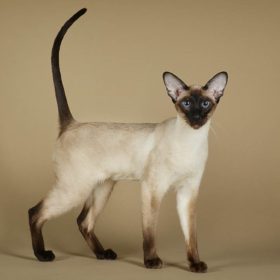 Siamese
Siamese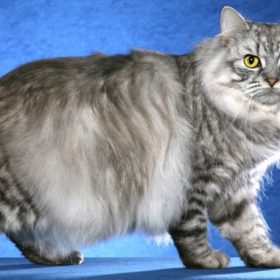 Cymric
Cymric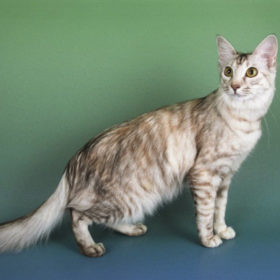 Oriental Longhair
Oriental Longhair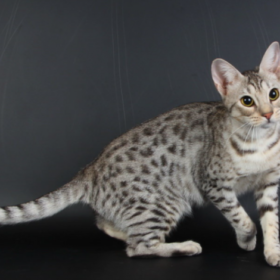 Australian Mist
Australian Mist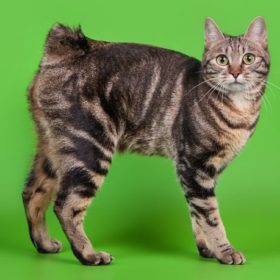 Kurilian Bobtail Shorthair
Kurilian Bobtail Shorthair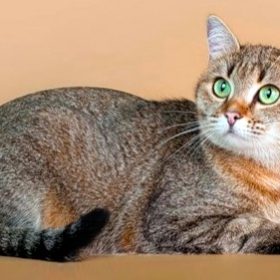 Celtic Shorthair (European Shorthair)
Celtic Shorthair (European Shorthair)